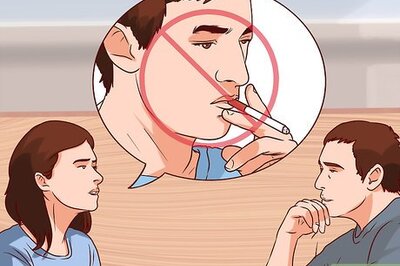
views
X
Research source
However, most professional flea and tick products contain toxic ingredients that can be fatal to kittens.[2]
X
Research source
Focus on removing the fleas and the ticks from the kitten using kitten friendly methods, and then get rid of any fleas or ticks still in your home to prevent another infestation.
Removing Fleas and Ticks from the Kitten

Use a flea comb. This is the safest and most efficient way to remove fleas from your kitten. You can buy a flea comb at your local pet store. Always comb out your kitten in a warm room so she does not get a chill or develop a cold, which could be fatal to a kitten. Put warm water in a bowl with a few drops of liquid detergent. Comb the fleas off of your kitten and place the fleas in the water. Swish the water around so the fleas drown. You can also dilute five parts water to one part bath oil and sponge or spray it onto the kitten’s coat. Then, use the flea comb to remove the fleas off her damp coat. Fleas will run from the driest parts of your kitten so they may swarm around her face. Grab them and drop them in a bowl of water so they drown. You can also place the removed fleas on a piece of double sided tape so they cannot move or escape. You can then drown them or crush them. If you have other cats or kittens, including the mother cat, in your home, always treat them for fleas as well. You do not want fleas from another animal to get back onto your kitten.

Speak to your vet about flea medications. Most flea medications can be deadly to kittens, and newborn kittens should always receive manual flea removal. However, kittens over four weeks old can be treated with Capstar. This product will kill adult fleas on your cat, but not their offspring. Other medications require your kitten to be at least eight weeks old for safe use and can kill any flea offspring. But you should always check with your vet before applying any flea medications to avoid harming your kitten. Avoid using natural oils on your kitten to remove fleas. Some oils, like lavender, eucalyptus, and geranium, are toxic to young kittens.

Use fine-tipped tweezers to remove ticks. You will also need a pair of gloves to protect your hands and a jar of insecticide or rubbing alcohol to drop the ticks into and kill them. Put on the gloves and hold your kitten with one hand, or have someone help you hold your kitten in place. Place the tweezers close to your kitten’s skin and grasp the tick’s head. Pull, rather than twist, the tick from the skin. Avoid crushing or squeezing the tick’s body, which will flood your kitten’s bloodstream with harmful bacteria. Drop the tick the jar of insecticide or rubbing alcohol to kill it. Always wash your hands well after you have removed all the ticks from your kitten. Apply antiseptic to the tick bites on your kitten to prevent infection. Your kitten may try to chew or itch the bites, so treat them daily with antiseptic so they stay clean. Check your kitten for any signs of a disease or infection and bring your kitten to your vet if she displays any symptoms of infection, such as fever, loss of appetite, lethargy, or stiff limbs.

Talk to your vet about tick prevention medications. There are several tick medications that you can apply to your kitten’s coat to remove ticks. However, these can cause health issues in kittens. Always check with your vet about tick prevention products before you use them on your kitten. If you have other cats or kittens, including the mother cat, in your home, always treat them for ticks as well. You do not want ticks from another animal to get back onto your kitten.
Getting Rid of Fleas and Ticks in Your Home

Understand the importance of removing fleas and ticks from your home. When your kitten contracts fleas or ticks, they do not just live in her fluffy coat. In fact, most of the flea and tick population live in any of the bedding, fabrics, or surfaces your kitten has come in contact with during the infestation. About five percent of the adult fleas live on your cat, and the rest are pupae, larvae, and eggs that live in the surfaces of your home. If you do not clean your kitten’s living environment, there could be persistent flea and tick outbreaks that could cause infection or illness for your kitten.

Gather all bedding and fabric items in your home. Use garbage bags to bag all bedding and fabric items, like cushions. You will then need to wash the bedding on the hottest setting to kill all pests and their offspring.

Vacuum your home thoroughly. Do an extensive vacuum of all the surfaces in your home. Focus on vacuuming in corners or covered areas, like under furniture or behind furniture, where fleas or ticks might be hiding. You should also vacuum the surfaces of furniture, curtains, and shelving. You can put a flea collar in your vacuum cleaner bag to help collect the fleas. After the vacuum, clean out the bag and dispose of it carefully. Empty out the vacuum bag every time you vacuum to prevent any fleas from escaping.

Use a professional pest control product. If you want to do a serious cleaning of your home to prevent another infestation, you can buy a professional pest control product from your local pet store. This product will likely come in the form of an aerosol “flea bomb” that will kill any remaining fleas or ticks. You and your pets should vacate your home before putting off the bomb. Flea bombs are toxic to other animals so you need to ensure all pets are out of the environment before setting off the bomb. You can also hire a professional pest controller to spray your home and your garden for fleas or ticks. The pest controller can use a spray that is formulated to be safe for pets.
Preventing Another Flea and Tick Infestation

Keep your kitten indoors. Ticks and fleas will latch on to your kitten when she plays outdoors or runs around outside. Prevent another infestation by keeping your kitten inside. If she does go outside, inspect her carefully for any fleas or ticks before letting her inside. Remove any pests right away to prevent another infestation in your home or on your kitten. As your kitten gets older, you can start to use a tick prevention spray or a topical flea treatment.

Vacuum your home weekly. Keeping your home clean and free of debris can also prevent fleas and ticks from living in your home undetected. Get into the habit of vacuuming your house at least once a week, especially if your kitten likes to go outdoors or if you have other pets in the home. You should also inspect your carpets, furniture, drapery, or storage areas for ticks or fleas once a week to prevent them from multiplying. If you notice any fleas or ticks, kill them right away.

Maintain your garden or yard. Ticks are attracted to tall grasses and shrubs, so keep your garden or yard tick free by mowing the lawn and trimming any shrubs or bushes. You can also treat your garden with pet-safe insecticide to keep the area flea and tick free.



















Comments
0 comment